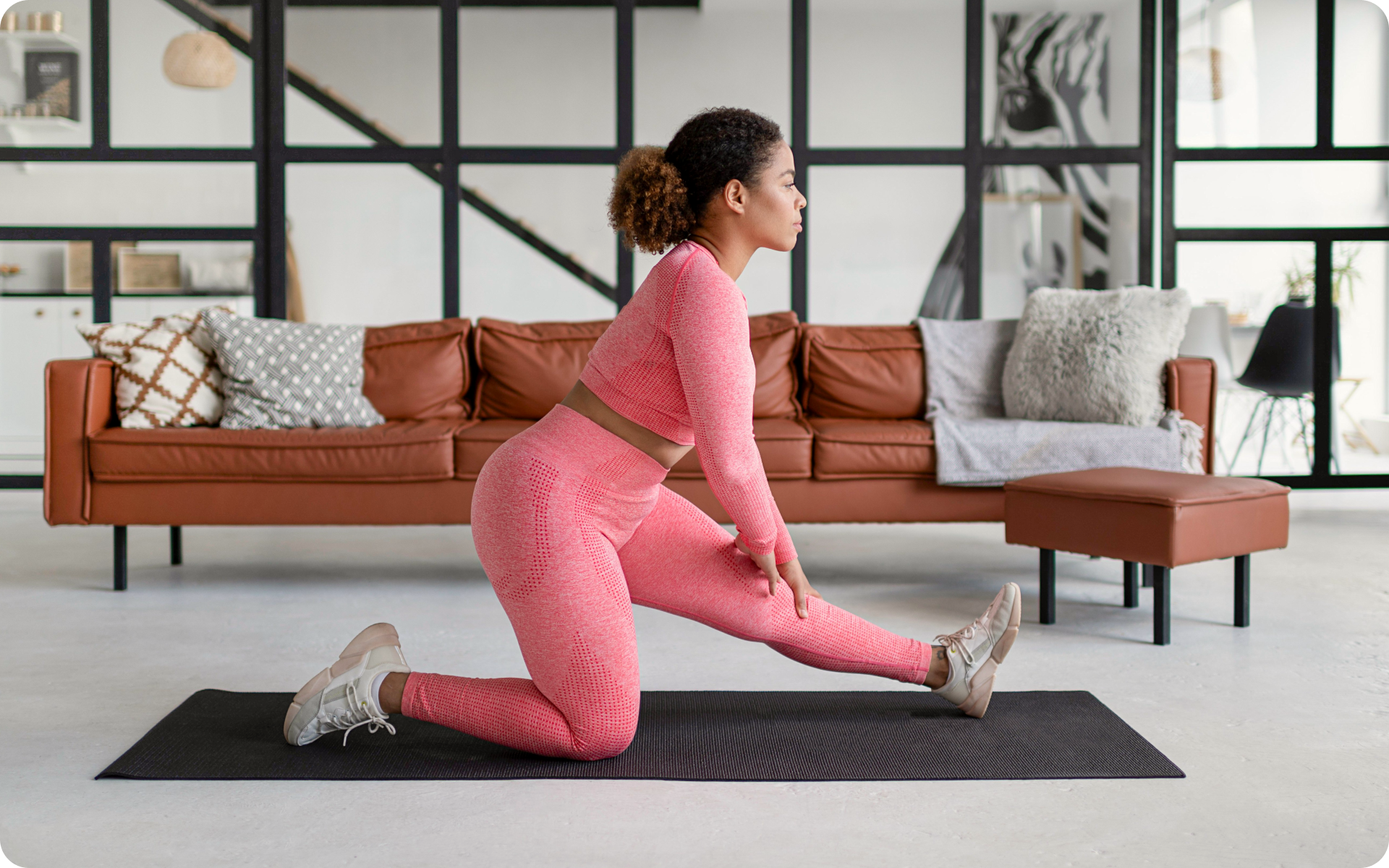Calories are a unit of energy, used to determine the amount of energy that is in food and drinks. Our bodies require a specific amount and use this energy to function properly. In addition to normal bodily functions, calories play a huge part in weight gain, loss, or maintenance.
You’ve probably heard that you need to eat at a calorie deficit to lose weight. You’ve probably also heard that you should aim to burn a specific number of calories each day if you want to achieve your weight loss goals. But how many calories is this?
If you have been struggling with the question “How many calories should I burn in a day?”, read on to find out more about what impacts calorie intake, how to burn more calories in a day, how exercise comes into play, and much more.
How Many Calories Should You Naturally Burn in a Day?
Firstly, the amount of calories you need and burn in a day is dependent on several factors including your age, height, sex, weight, and activity level (10). Exercise is what many of us think of when we think about burning calories quickly.
However, did you know that simply being alive actually burns calories? Your body burns calories even when you aren’t doing anything and this is the most natural way to use up any energy ingested from food and drinks. This is known as your basal metabolic rate (BMR) or your resting metabolic rate (RMR).
Secondly, according to a study that was published in 2005, your basal metabolic rate is influenced by a number of factors including fat-free mass, fat mass, and age(6). As these factors differ from person to person, it is difficult to say exactly how many calories you should burn in a day while at rest.
If you struggle to even flirt with the idea of giving up your favorite foods or working out till your legs give way – BetterMe app is here to breathe a fresh perspective into the way you view the weight loss process! Check out the app and experience the fun side of fitness and dieting with BetterMe!
However, this does not mean that you cannot estimate the number of calories you burn in a day while at rest. The Harris-Benedict formula is a popular way of calculating what your daily BMR is (9). Here’s how to do it (5):
For women (assigned female at birth):
655.0955 + (9.5634 x weight in kg) + (1.8496 x height in cm) – (4.6756 x age in years)
For men (assigned male at birth):
66.4730 + (13.7516 x weight in kg) + (5.0033 x height in cm) – (6.7550 x age in years)
The number you get using this formula is a pretty good estimate of how many calories your body naturally burns on a daily basis.
How Many Calories Should I Burn in a Day to Lose Weight?
It is advisable to aim to burn between 400 and 500 calories a day if you want to lose weight (1). But why is this?
According to the CDC, gradual and sustainable weight loss is equal to losing just 1 to 2 pounds of fat a week at most (7). A simplified approach is: 1 pound of body fat is approximately the equivalent of 3,500 calories (2). So with this in mind:
If you need to burn 3,500 calories a week to lose weight then (3,500 calories ÷ 7 days a week) = 500 calories a day
How to Burn 500 Calories a Day to Lose Weight
Burning or cutting 500 calories a day is actually not as difficult as you might think. Here are some tips that can help you out:
Go on a calorie deficit
This is perhaps the easiest way of cutting 500 calories a day from your diet.
To do this, get a calorie tracker and meticulously track how many calories you eat every day for several days – tracking over several days is better as this will give you a more accurate number than simply tracking one day. Once you have this number, subtract 500 from it. Set this new number as your daily caloric intake and make sure you do not go over this number from now on.
Do not drink your calories
Yes, drinks count toward your daily calorie intake too, not just food.
Switch out high-sugar sodas for diet options or cut them out altogether. Choose homemade smoothies over store-bought and switch from sports energy drinks to coconut water or organic fruit juices occasionally.
Watch out for snacks
Calorie intake is not just from the three main meals of the day. As with drinks, snacks also count.
Switch out high-calorie treats for more low-calorie options. This will give you more calorie allowance during meal times, which means you don’t have to starve after cutting down your calorie intake.
Avoid alcohol
Most alcoholic drinks, particularly cocktails, are higher in calories than you might think.
Not only are these empty calories that add and do nothing for your body, but drinking alcohol can also make you crave oily and fatty foods that are not good for you or your weight loss efforts.
Exercise
Fixing your diet will help you avoid the 500 calories, but exercising will help you burn them. Simple exercises such as walking, running, cycling, swimming, yoga, and HIIT can help you burn 500 calories (and sometimes more) a day.
Read more: What Does 3000 Calories Look Like?
How Many Calories Can You Realistically Burn in a Day Through Exercise?
There are several factors that influence calories burned in a workout, so it’s difficult to say exactly how many calories a person can expect to burn during an exercise session.
However, according to Harvard Health Publishing, most gym exercises and sports activities will typically burn anything between 100 and 500 calories in 30 minutes, depending on your weight and how vigorously you exercise (also called workout intensity (4). Very few exercises will go above the 500 mark in just 30 minutes, particularly if you don’t weigh a lot.
Is it Enough to Burn 500 Calories a Day?
Yes, burning just 500 calories a day is enough to help you start losing weight in a healthy and sustainable way. It is best to achieve this through a combination of a healthy calorie deficit diet and regular exercise.
Whether you’re a workout beast or just a beginner making your first foray into the world of fitness and dieting – BetterMe has a lot to offer to both newbies and experts! Install the app and experience the versatility first-hand!
FAQs
What is calorie maintenance?
Also known as maintenance calories, this is the amount of food energy that you should consume each day to ensure that you neither lose nor gain weight.
If you are happy with your current weight and do not want to risk losing or gaining any more, you should get a calorie calculator and carefully track your normal eating for a few days.
The average number you get is likely your maintenance number. If you make sure you hit this number every day, you should keep your weight where it currently is.
It’s important to note that calorie maintenance is not the opposite of the popular calorie deficit. The opposite is actually a calorie surplus, which simply means eating more calories than your body needs/burns with the aim of gaining more weight or muscle.
How can I determine the total calories burned in a day by walking?
The best way of accurately determining this or simply the calories burned by walking for one hour is to use a fitness tracker. These trackers determine this by using your step count, your height, and your weight. Sometimes your pace will also come into play when determining how many calories you burn after an hour or a day.
How many calories are burned when hiking?
According to Harvard Health Publishing, 30 minutes of cross-country hiking will burn:
- 170 kcal in a 125-pound person
- 216 kcal in a 155-pound person
- 252 kcal in a 185-pound person
Is burning 300 calories at the gym good?
Yes, burning 300 calories at the gym is a good starting point for long-term weight loss. A 300-calorie weight loss workout can also help increase your strength levels. However, for better and faster weight loss results, you should aim for at least a 500-calorie workout.
How many calories will 10,000 steps burn?
A fitness tracker is the best way of determining how many calories you can burn by walking 10,000 steps a day. These trackers often do this by calculating your steps per mile versus your height and weight.
Very Well Health estimates the following calories burned by walking 5,000 or 10,000 steps for people of different heights and weights (8).
People with a height of 6’ or above
| 120 lbs | 160 lbs | 180 lbs | 200 lbs | 275 lbs | 300 lbs | |
|---|---|---|---|---|---|---|
| 5,000 steps |
165 kcal | 218 kcal | 245 kcal | 273 kcal | 375 kcal | 410 kcal |
| 10,000 steps |
330 kcal | 435 kcal | 490 kcal | 545 kcal | 750 kcal | 820 kcal |
People with a height of 5’6” to 5’11”
| 120 lbs | 160 lbs | 180 lbs | 200 lbs | 275 lbs | 300 lbs | |
|---|---|---|---|---|---|---|
| 5,000 steps |
150 kcal | 198 kcal | 223 kcal | 248 kcal | 341 kcal | 373 kcal |
| 10,000 steps |
300 kcal | 395 kcal | 445 kcal | 495 kcal | 682 kcal | 745 kcal |
People with a height of 5’5” or under
| 120 lbs | 160 lbs | 180 lbs | 200 lbs | 275 lbs | 300 lbs | |
|---|---|---|---|---|---|---|
| 5,000 steps |
138 kcal | 181 kcal | 204 kcal | 227 kcal | 313 kcal | 342 kcal |
| 10,000 steps |
275 kcal | 363 kcal | 408 kcal | 454 kcal | 625 kcal | 683 kcal |
What exercise burns the most calories?
There is still no consensus regarding which exact exercise burns the most calories. Some sources claim that running burns the most, while others insist that jumping rope, dancing, or rowing burn the most calories.
Ultimately, if you are looking to burn a lot of calories in a short period, you should try a high-impact cardio workout. Unlike weightlifting, cardio tends to burn a lot of calories quickly, and the more vigorous or intense your session is, the more calories you will burn.
However, for the best results, a HIIT workout may be the best option for quick calorie burning (3).
How many calories do I need to burn to lose 1 Kg?
You will need to burn 7,700 calories to lose approximately 1 kg of body weight/fat.
As previously stated, 1 pound of fat (0.453 kgs) is equal to 3,500 calories, so 1 kg (2.2 pounds) of fat is double this. It’s important to remember that this is a general guide and various factors can influence the amount of weight lost.
Can I burn calories to gain muscle?
To gain muscle, you generally need to be in a calorie surplus and not a calorie deficit. However, if you want to lose weight, which requires a deficit, and also gain muscles, you are advised to eat adequate protein for your individual needs and follow a structured resistance-training program. These two factors will help with muscle gain, even when in a deficit (11).
The Bottom Line
The answer to “how many calories should I burn in a day?” is more complicated than many people think. Calorie burning is influenced by too many factors for this question to have one answer that is correct for everyone.
However, if you want to track and increase your daily calorie burning for weight loss, you should track your diet using a calorie counter, drink more water, and exercise more. This will increase your basal metabolic rate, which will help you burn calories naturally, but working out will also add to the number of calories burned in a day. This all leads to weight loss.
DISCLAIMER:
This article is intended for general informational purposes only and does not serve to address individual circumstances. It is not a substitute for professional advice or help and should not be relied on for making any kind of decision-making. Any action taken as a direct or indirect result of the information in this article is entirely at your own risk and is your sole responsibility.
BetterMe, its content staff, and its medical advisors accept no responsibility for inaccuracies, errors, misstatements, inconsistencies, or omissions and specifically disclaim any liability, loss or risk, personal, professional or otherwise, which may be incurred as a consequence, directly or indirectly, of the use and/or application of any content.
You should always seek the advice of your physician or other qualified health provider with any questions you may have regarding a medical condition or your specific situation. Never disregard professional medical advice or delay seeking it because of BetterMe content. If you suspect or think you may have a medical emergency, call your doctor.
SOURCES
- Burn This Number of Calories in a Day to Lose Weight, According to Experts (2022, cnet.com)
- Caloric Equivalents of Gained or Lost Weight (1958, sciencedirect.com)
- Caloric expenditure of aerobic, resistance, or combined high-intensity interval training using a hydraulic resistance system in healthy men (2015, pubmed.ncbi.nlm.nih.gov)
- Calories burned in 30 minutes for people of three different weights (2021, health.harvard.edu)
- Comparison of the Harris-Benedict Equation, Bioelectrical Impedance Analysis, and Indirect Calorimetry for Measurement of Basal Metabolic Rate among Adult Obese Filipino Patients with Prediabetes or Type 2 Diabetes Mellitus (2018, ncbi.nlm.nih.gov)
- Factors influencing variation in basal metabolic rate include fat-free mass, fat mass, age, and circulating thyroxine but not sex, circulating leptin, or triiodothyronine (2005, pubmed.ncbi.nlm.nih.gov)
- Losing Weight (2023, cdc.gov)
- Steps to Calories Converter (2023, verywellfit.com)
- The centenary of the Harris-Benedict equations: How to assess energy requirements best? Recommendations from the ESPEN expert group (2021, pubmed.ncbi.nlm.nih.gov)
- The New Science on How We Burn Calories (2021, nytimes.com)
- Yes, You Can Lose Weight and Gain Lean Muscle at the Same Time With This Strategy (2023, cnet.com)









